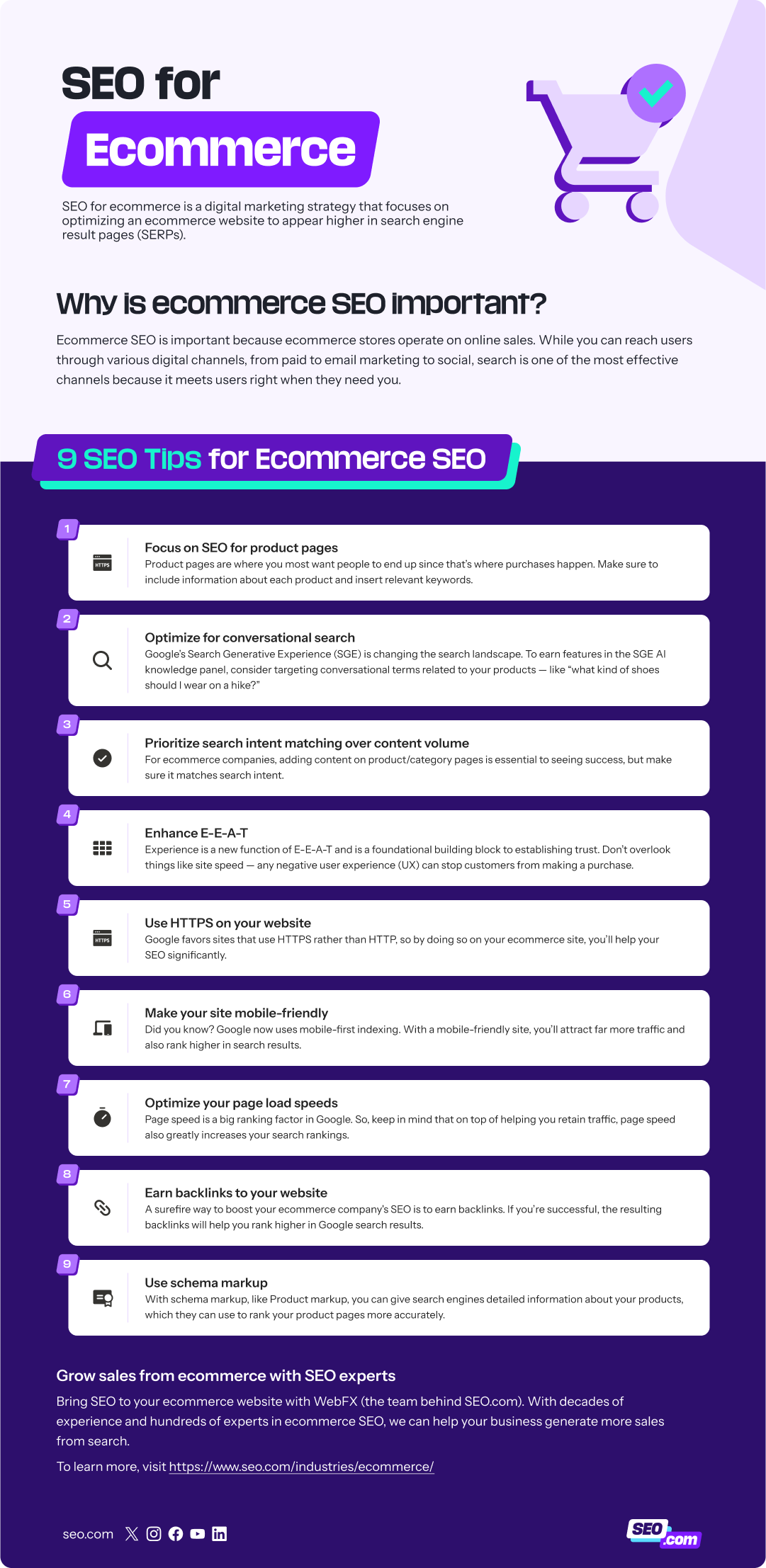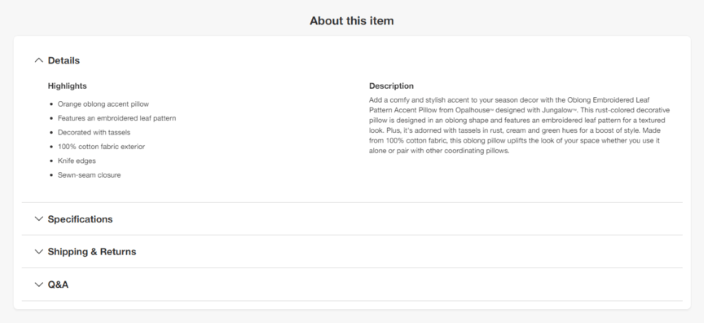Nowadays, SEO isn’t an optional activity for ecommerce websites. It’s a must-have if you want to succeed in an increasingly competitive digital landscape. You not only need to try and outperform direct competitors in your niche, but your ecommerce store likely competes against behomeths like Amazon and Walmart for search traffic. With SEO driving so much revenue for ecommerce stores, the time is now to improve your site’s performance in search. Use our helpful guide to get started on improving your search visibility or reach out to our team if you’d like a partner to improve your ecommerce SEO.
What is SEO for ecommerce?
SEO for ecommerce is a digital marketing strategy that focuses on optimizing an ecommerce website to appear higher in search engine result pages (SERPs). It typically involves optimizing product pages, improve page load speed, researching and targeting keywords, and more.

Why is ecommerce SEO important?
Ecommerce SEO is important because ecommerce stores operate on online sales. While you can reach users through various digital channels, from paid to email marketing to social, search is one of the most effective channels because it meets users right when they need you.
There is so much ahead for ecommerce clients this year! What comes to mind first is the way that Search Generative Experience (SGE) is going to revolutionize SEO as we know it. SGE is going to introduce conversational search for search engines, making the search intent of our product and category pages and blog posts all the more important to optimize for SEO.
Another huge factor is E-E-A-T: Expertise, Experience, Authoritativeness and Trustworthiness. This is even more important for ecommerce companies because we need not only need to convince users at the site level with a strong checkout experience, but also at the product level with star ratings, reviews, and more.

Plus, search engines like Google deliver enhanced results for ecommerce-based searches, like “brown shoes size 6.” These enhanced results, which can include images, stars, and more, all work to bring users to your site.
What tools should I use for ecommerce SEO?
Before getting started with ecommerce search engine optimization, it’s important to have your toolkit. While there are plenty of free SEO tools available, you’ll likely find more flexibility and capabilities from a paid tool.
Here are our recommendations:
- Screaming Frog for website audits
- Google Search Console for performance monitoring
- Google Analytics 4 for performance monitoring
- Ahrefs for keyword research, backlink analysis, and competitor research
Additional tools that SEOs like include:
- Semrush
- Ubersuggest
- Google Keyword Planner
Learn how to use these ecommerce SEO tools in your strategy below!
Get SEO help from ecommerce SEO pros 
Attract more customers with professional SEO services from WebFX — the team behind SEO.com that’ll bring 175,000+ hours of ecommerce SEO experience to your campaign.
How to create an ecommerce SEO strategy
Build an effective ecommerce SEO strategy with these tips:
- Audit your site’s SEO with a tool like Screaming Frog
- Understand your company’s growth objectives for the next few years
- Shadow your sales and/or customer support teams to understand your market
- Establish specific, measurable, actionable, realistic, and timely SEO goals
- Set up your analytics and tracking tools, like GA4 and Google Search Console
With the above steps complete, you can start doing SEO for your ecommerce site.
9 practical tips for ecommerce SEO
Learn how to get started with SEO for ecommerce websites with these best practices (for a more in-depth walkthrough, check out our SEO Basics Guide!):
1. Focus on SEO for product pages
Where there are ecommerce websites, there are product pages. Those pages are where you most want people to end up since that’s where purchases happen. For that reason, it’s critical that you follow SEO best practices for product pages.
One of the best ways to do that is to target some of the best SEO ecommerce keywords, and integrate those keywords into the pages.
Make sure to include information about each product, and insert relevant keywords into that information. You should also consider focusing on long-tail keywords — those that are several words long — to target more specific search results.

In addition to using keywords, you should include multimedia on these pages, like images and videos. That makes the pages more appealing, driving more website traffic and further increasing your rankings.
You may also want to consider optimizing your product listings on online shopping sites like Etsy and Amazon.
2. Optimize for conversational search
Google’s Search Generative Experience (SGE) is going to change the search landscape.
Blog content is no longer optional for ecommerce companies. To earn features in the SGE AI knowledge panel, consider targeting conversational terms related to your products — like “what kind of shoes should I wear on a hike?”
Some SEO agencies, like SEO.com, offer SGE optimization services to help you get started.
3. Prioritize search intent matching over content volume
Google’s Helpful Content Update that rolled out last year prioritizes content intent over volume.
For ecommerce companies, adding content on product/category pages is essential to seeing success, but make sure it matches search intent. If you’re writing an article on your category pages, you’ll likely attract top-of-funnel searchers instead of people who are ready to buy.
4. Enhance E-E-A-T
Experience is a new function of E-E-A-T and is a foundational building block to establishing trust. Don’t overlook things like site speed or even your search bar — any negative user experience (UX) can stop customers from wanting to purchase on your ecommerce site.
5. Use HTTPS on your website
Something many businesses don’t think about when it comes to SEO is using the HTTPS protocol. But it’s actually one of the easiest and most crucial ways to improve your SEO. Google favors sites that use HTTPS rather than HTTP, so by doing so on your own site, you’ll help your SEO significantly.
Plus, HTTPS is extra important for ecommerce sites. Considering that your site requires people to submit their financial information to make purchases, you want them to feel that their info will be secure. So, you definitely want your online store to use HTTPS, thereby having that extra layer of website security.
6. Make your site mobile-friendly
Back in the 2000s, the only way most people would visit a website was on a computer. But today, tons of Internet traffic happens on mobile devices. In fact, Google now uses mobile-first indexing, which means they rank sites based on their mobile versions, not their desktop ones.
Because of that, it’s essential that your website is mobile-friendly.
The best way to make that happen is to use responsive design. Responsive design is a type of web design where the page elements rearrange themselves to fit whichever screen they appear on. That means your website will display equally well on both computers and phones.


With a mobile-friendly site, you’ll attract far more traffic and also rank higher in search results.
7. Optimize your page load speeds
If you want to drive people away from your site, one of the best ways to do it is to make sure your pages load really, really slowly.
But odds are, you don’t want to do that.
So, in that case, you should do the opposite — make your page load speed is as fast as possible. To do that, you can:
- Cache web pages
- Compress images
- Minify code
- Limit redirects
You don’t want your pages to take longer than three seconds to load. Ideally, they’ll take only one or two seconds. Keep in mind that on top of helping you retain traffic, this will also greatly increase your search rankings since page speed is a big ranking factor in Google.
8. Earn backlinks to your website
Finally, a surefire way to boost your ecommerce company SEO is to earn backlinks. Backlinks are where a third-party website links to your content. Why is this beneficial? Because if a reputable site in your industry links to your content, that signals to Google that your site must be reputable as well.
To obtain backlinks, you can visit reputable websites in your industry and look for linking opportunities like broken or missing links. When you find those opportunities, you can contact the site owners to let them know about the broken or missing links and then recommend that they fix the issue with a link to your site.
If you’re successful, the resulting backlinks will help you rank much higher in Google search results. This is why earning backlinks are always included in our free SEO checklist. As a side note, this is another reason why it’s important to have informational content on your site — you’re not likely to earn a backlink to a product page.
9. Use schema markup
Schema markup is your direct line to search engines. With schema markup, like Product markup, you can give search engines detailed information about your products, which they can use to rank your product pages more accurately.
Product markup shares information like:
- How much your product costs
- How much inventory is left
- How reviewers rate the product
- And more
Besides Product markup, consider using FAQmarkup to answer common shopper questions, like your return policy, shipping regions, product guarantees, and anything else relevant to your target market.
Grow sales from ecommerce SEO with SEO experts
Bring SEO to your ecommerce website with WebFX (the team behind SEO.com). With decades of experience and hundreds of experts providing ecommerce SEO services, we can help your business generate more sales from search.
Contact us online today to learn more about our SEO services!
Let’s Drive Results Together 
Table of Contents
- What is SEO for Ecommerce?
- Why is Ecommerce SEO Important?
- What Tools Should I Use for Ecommerce SEO?
- How to Create an Ecommerce SEO Strategy
- 9 Practical Tips for Ecommerce SEO
- 1. Focus on SEO for Product Pages
- 2. Optimize for Conversational Search
- 3. Prioritize Search Intent Matching over Content Volume
- 4. Enhance E-E-A-T
- 5. Use HTTPS on Your Website
- 6. Make Your Site Mobile-friendly
- 7. Optimize Your Page Load Speeds
- 8. Earn Backlinks to Your Website
- 9. Use Schema Markup
- Grow Sales from Ecommerce SEO with SEO Experts

Meet
The top digital marketing company behind SEO.com.
Ready to get results? Connect with us, today!
Writers





